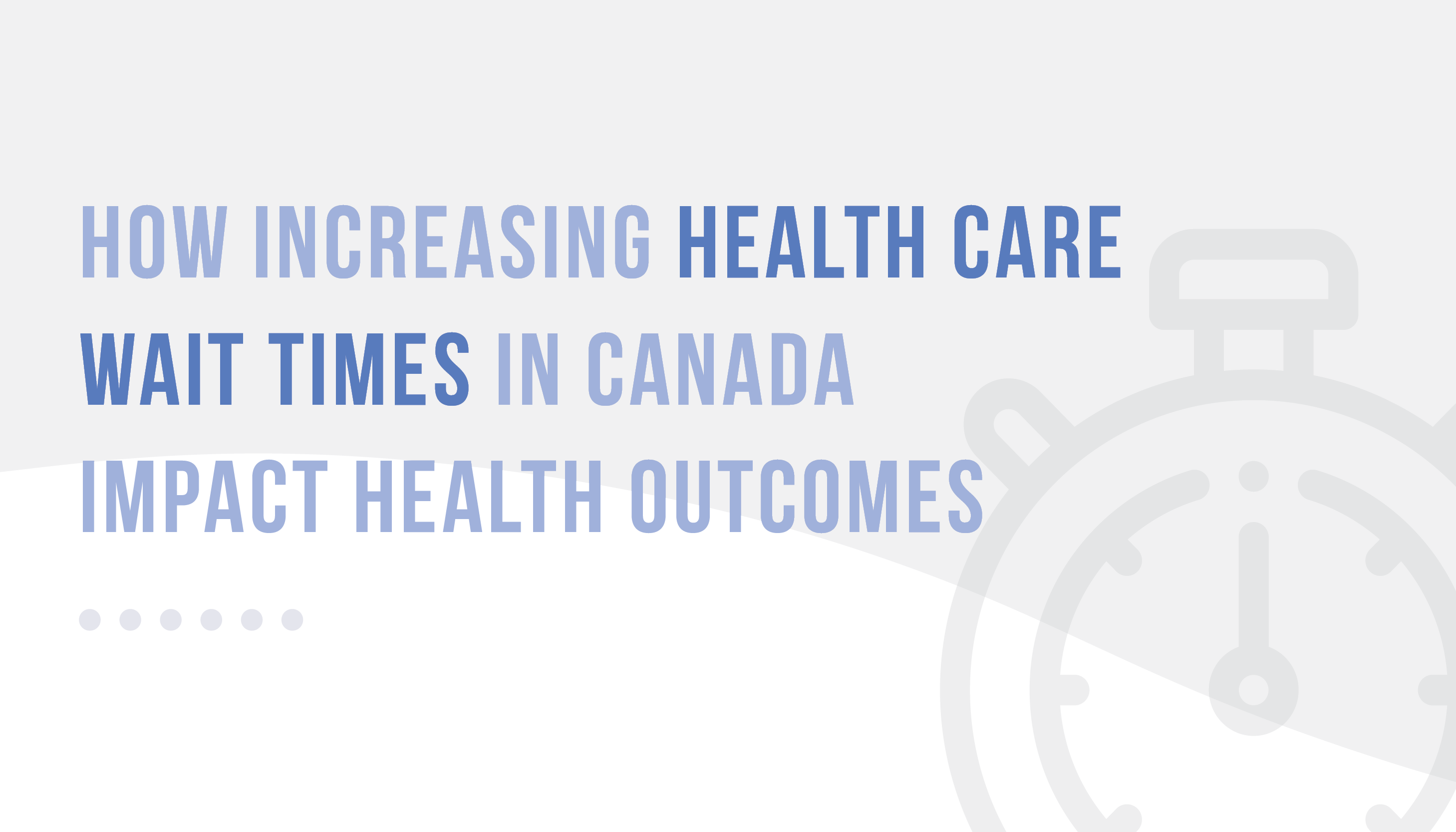How Increasing Healthcare Wait Times in Canada Impact Health Outcomes
By: Benefits by Design | Tuesday January 18, 2022
Updated : Monday February 24, 2025
Canada’s healthcare system has long been burdened by lengthy wait times, even when compared to other G7 countries, like the U.S. or the U.K. In fact, according to a study conducted by the Fraser Institute in 2018, Canada is among the highest spenders on healthcare, yet ranks near the bottom on number of doctors, hospital beds, and wait times.
Download the new Infographic: 2024 Wait Times For Health Care In Canada (PDF: 1.3MB)
The COVID-19 pandemic has made matters worse and exposed the flaws in the Canadian healthcare system. Its fragility is growing more evident as delayed treatments and surgeries, staff shortages, and untreated conditions become more commonplace, and their effects on Canadians’ health become more detrimental.
Download the Infographic: 2022 Wait Times For Health Care In Canada (PDF: 347KB)
Canada’s Healthcare Wait Times Increased in 2021
Download Infographic: Wait Times for Healthcare in Canada 2021 (PDF: 122 KB)
Overall, healthcare wait times in Canada for medically necessary treatments increased in 2021.
In an annual study conducted by the Fraser Institute, specialist physicians reported a median waiting time of 25.6 weeks in 2021 between referral from a general practitioner and receipt of treatment. In 2020, it was 22.6 weeks, and in 1993, the median wait time was only 9.3 weeks. While it’s clear that Canada‘s increasing healthcare wait times are part of a larger issue and not merely a result of the pandemic, COVID-19 is having a significant impact.
In July 2020, we discussed the already lengthening wait times for Canadians and speculated on its effects. Now, nearly two years later, we’re seeing those effects come to light.
Effects of Canada’s Healthcare Wait Times on Canadians
The effects of long wait times on health outcomes is well-documented.
For example, prolonged wait times for cancer and heart disease have been associated with increased risk of morbidity and mortality. Likewise, it’s been shown that patients suffering from mental health conditions that do not receive timely access to care often experience a rapid decline in their condition.
However, negative impacts of long wait times on Canadians aren’t limited to health. We’ll pull a quote from this research paper to drive this one home:
“Subsequently, worse health outcomes are often associated with higher costs to individuals, as waiting for care may be burdened by a loss of income due to the inability to work.”
As the number of Canadians waiting for crucial healthcare grows, so too does the impact on their wallets and workplaces.
Major Healthcare Impacts as a Result of Increased Wait Times
Long wait times bring significant and detrimental impacts to the Canadian healthcare system and Canadians’ health outcomes, including:
Cancelled or delayed procedures and appointments
Delays to crucial healthcare and surgeries can turn curable diseases and ailments into chronic conditions, disabilities, or even death. A woman in Ontario with stage-4 colon cancer recently had a life-saving surgery postponed “indefinitely” as a result of non-urgent surgeries being postponed to keep hospital beds free during the omicron COVID-19 wave.
Progression of disease
Acute and chronic conditions can progress or worsen while waiting for necessary procedures, and may even pass a point of no return, where the original procedure they’re waiting for is no longer an option or is less effective. Not to mention that, in many cases, people may be in considerable pain or discomfort while they wait.
Loss of income
Canadians aren’t just losing their health while they wait for their healthcare system — they’re losing their incomes and livelihoods. Employees may be unable to work while they wait for necessary procedures, leading to increased stresses.
Worsening health outcomes
The longer Canadians wait for care, the worse their health outcome becomes. What’s more, these negative health impacts can begin to have a compounding effect, where one problem creates two others. Consider the mental health impacts of remaining in constant discomfort or pain, or being unable to work. Having your mobility affected by an injury or illness can also impact mental health and anxiety.
Economic impacts
It’s been estimated that wait times cost Canada’s economy $2.1 billion in lost wages and productivity in 2019. This comes out to about $2,000 per patient. That figure has likely increased substantially in 2020 and 2021 as a result of the pandemic, whose economic impacts are already pretty staggering.
Mental health impacts
The correlation between mental health, health outcomes, and disability is clear, and has been for a long time. The longer Canadians remain stressed, in pain, and sick, the worse their mental health becomes. All of this in a country that is already combatting a major mental health crisis.
Addressing the Troubling Trend of Rising Disability Claims in Canada
Canada’s Healthcare Wait Times: Not Just a Result of COVID-19
It’s important to recognize that, although the pandemic has had a significant impact on healthcare wait times in Canada, it’s a much bigger problem than just COVID-19. Canada’s healthcare wait times have been among the highest in the world for a long time, the reasons behind which are complicated, varied, and too much to discuss here — perhaps another time!
But what is clear is that Canada’s healthcare wait times are not purely a result of the pandemic, and they will likely continue to remain a problem in its wake. Even after the dust has settled, wait times in Canada have proven to be high. Can we expect this to change in time?

Infographic: Wait Times for Health Care in Canada
Data is derived from Waiting Your Turn: Wait Times for Health Care in Canada 2019 Report and 2021 Report from the Fraser Institute
Median Wait Times by Province in 2021
Weeks waited from a General Practitioner referral to treatment:
British Columbia — 26.2 weeks
Alberta — 24 weeks
Saskatchewan — 30.9 weeks
Manitoba — 31.5 weeks
Ontario — 18.5 weeks
Quebec — 29.1 weeks
Newfoundland and Labrador — 21.1 weeks
New Brunswick — 39.7 weeks
Prince Edward Island — 41.6 weeks
Nova Scotia — 53.2 weeks
Specialties
Cardiology — Study and treatment of disorders of the heart and blood vessels.
General Surgery — Surgical care for alimentary tract, abdomen, breast, skin, and soft tissue, and the endocrine system.
Otorhinolaryngology — Medical and surgical specialty that focuses on head and neck diseases and disorders.
Ophthalmology — Study and treatment of disorder of the eye.
Orthopaedic Surgery — Treatment of disorders of the bones, joints, ligaments, tendons and muscles.
Urology — Treatment of the male and female urinary tract (including kidneys).
Median Wait Times by Specialty in 2021
Weeks waited from General Practitioner referral to treatment:
Orthopaedic Surgery — 46.1 weeks
Ophthalmology — 30.6 weeks
Otorhinolaryngology — 34.4 weeks
Urology — 21.6 weeks
General Surgery — 18.1 weeks
Cardiology — 11.8 weeks
Diagnostic Tests
In Alberta, you’ll be waiting 10 weeks to receive a CT-Scan compared to Saskatchewan where you’ll only be waiting 4 weeks.
Need an MRI? In Prince Edward Island, you could be waiting for over 5 months (22 weeks).
Median Wait Times by Province in 2019
Weeks waited from a General Practitioner referral to treatment:
British Columbia — 24 weeks
Alberta — 28 weeks
Saskatchewan — 26 weeks
Manitoba — 32.4 weeks
Ontario — 16 weeks
Quebec — 16.3 weeks
Newfoundland and Labrador — 23.4 weeks
New Brunswick — 39.7 weeks
Prince Edward Island — 49.3 weeks
Nova Scotia — 33.3 weeks
Median Wait Times by Specialty in 2019
Weeks waited from General Practitioner referral to treatment:
Orthopaedic Surgery — 39.1 weeks
Ophthalmology — 28.4 weeks
Otorhinolaryngology — 25.3 weeks
Urology — 15.1 weeks
General Surgery — 14.9 weeks
Cardiology — 11.2 weeks
Diagnostic Tests
In Alberta, you’ll be waiting 7 weeks to receive a CT-Scan compared to Saskatchewan where you’ll only be waiting 2.5 weeks.
Need an MRI? In Prince Edward Island, you could be waiting for over 4 months (18 weeks).


![[FREE DOWNLOAD] Group insurance Quick Tax Facts Guide for 2026](https://www.bbd.ca/wp-content/uploads/2026/02/Group-insurance-Quick-Tax-Facts-Guide-for-2026-Banner.webp)